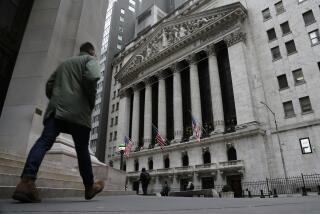Global jitters as Britain, Germany announce severe spending cuts
Reporting from Washington, London and Los Angeles — Europe’s debt crisis sent more shockwaves around the world Monday as Britain’s new prime minister announced drastic cutbacks in government spending and Germany pressed ahead with its own austerity plans — steps that are likely to impede the U.S. and global economic recoveries.
British Prime Minister David Cameron warned that spending cuts would be felt “for years, perhaps even decades.” And German Chancellor Angela Merkel, who presides over Europe’s biggest economy, announced similar plans for spending reductions, higher taxes and other belt-tightening measures.
The British and German actions reflect concern about the consequences of government debt crises in Greece, Spain and other weaker European economies, but they also amount to a blunt rejection of the Obama administration’s warnings that cutbacks now could imperil the global recovery.
Europe’s woes already have been blamed for triggering a plunge in global stock markets in the last five weeks. On Monday the Dow Jones industrial average fell 115 points, or 1.2%, to 9,816, the lowest close for the blue-chip index since November. The Dow has fallen more than 12% since late April.
Sinking stock prices increase the risk that American consumers will cut back their spending and that companies will not invest or add new workers.
By most accounts, the U.S. economy has been growing since last summer, thanks largely to federal stimulus spending and rising global demand for American goods. But hiring has been muted and a slowdown in Europe would only make matters worse.
Deep government spending cuts, amid an already weak economic outlook there, would make Europe more vulnerable to falling back into recession, threatening demand for U.S. exports — a crucial part of President Obama’s job-creation strategy.
“It undermines the Obama administration’s push to double exports in five years,” said Jacob Kirkegaard, a European specialist at the Peterson Institute for International Economics.
Germany, an export powerhouse, already runs a large trade surplus with the U.S., and the Obama administration has been pressing Berlin to maintain government support to beef up domestic consumption especially now that weaker European Union nations are pulling back.
“Not only are they not going to expand demand, they’re going to continue with fiscal austerity and if anything they’re going to reduce demand,” said Kirkegaard. He added that France was likely to follow suit with its own belt-tightening measures.
The slowing of growth in Europe is expected to put more pressure on the euro — which fell Monday to a four-year low of $1.19, down from $1.43 at the start of the year. That automatically makes U.S. goods more expensive in the 16 countries that use the euro – and harder to sell in countries where U.S. exporters compete with Europeans.
A weak euro also means U.S. companies earn less from their significant European operations when they convert their profits into dollars.
“That is going to be a hit to earnings for a lot of U.S. companies,” said John Silvia, an economist at Wells Fargo & Co. in Charlotte, N.C.
Most analysts still don’t think the American economy will slide back into recession. After a devastating contraction, many U.S. corporations have enjoyed a string of strong quarters. They also have been investing significantly to restock inventories and buy equipment and machinery, adding a major support to the broader economy.
Even so, economists have become increasingly nervous about the strength of the recovery. Retail sales are showing signs of slowing, and federal support for housing and other parts of the economy are fading this year, raising questions about the private sector’s ability to pick up the slack.
“The U.S. economy was not doing all that well anyway, so when you lay the European drag on top of it, the probability of a double-dip recession increases,” said Sung Won Sohn, an economist at Cal State Channel Islands. He put the odds of another U.S. recession at 30% — double his earlier estimate in spring.
Worse, he and other economists said, is that the U.S. has little in its arsenal to fight the slowdown coming from Europe. The Federal Reserve already has lowered short-term interest rate to near zero, and many lawmakers in Washington, including those in Obama’s own party, are loathe to push through more stimulus measures.
“The U.S. is going to be in an unenviable position of having a large budget deficit combined with a rising trade deficit at a time of high unemployment,” Kirkegaard said.
The Obama administration also has pledged to rein in its debt, but only after the economy gets on solid footing. Europe isn’t waiting.
In London, Cameron, whose Conservatives took power in a coalition last month after pledging to tackle the national deficit, said Monday that Britain’s finances were in worse shape than previously thought.
He gave no hint where or how deep the ax would fall. But in his bluntest terms since taking office, the prime minister said Britain’s deficit was the biggest ever recorded in peacetime, that its debts were unsustainable and that austere times lay ahead.
“Because the legacy we’ve been left is so bad, the measures that we need to deal with it will be unavoidably tough,” Cameron said in a speech in Milton Keynes, north of London. “But people’s lives will be worse unless we do something now.”
In Berlin, meanwhile, Merkel’s ruling coalition said it could narrow Germany’s budget gap by $13.3 billion next year.
“The last few months have shown … how important it is to have solid finances,” Merkel said, touting the new measures as Germany’s toughest since World War II.
Countries across Europe have unveiled austerity packages of varying magnitude in recent months in an attempt to reassure investors that they can pay their bills and that the euro will survive.
Greece, Spain, Ireland, Portugal and Italy, all in the Eurozone, say they are committed to deep cuts despite the hardship such measures will cause and the social unrest threatened by unions and other groups.
Beyond the economic fallout, many investors worry that Europe could lead the world into a new banking crisis.
European banks, nervous about lending to one another amid mounting concern about the continent’s financial situation, in recent days have been parking record sums in overnight deposits with the European Central Bank.
“That tells you that [banks] believe that cash under the mattress” is safer than lending to one another, said David Ader at investment firm CRT Capital Group in Stamford, Conn.
Despite the May 10 announcement by the European Union and the International Monetary Fund of a nearly $1-trillion, three-year plan to lend to any countries that couldn’t roll over their debts in normal market channels, investors have devalued bonds issued by Spain, Portugal, Italy and other deficit-ridden countries.
That has caused rising concern about the health of the European banking system because many of the banks own huge chunks of government debt.
European bankers’ reluctance to lend to each other is bringing back memories of the credit nightmare that followed the failure of brokerage Lehman Bros. in September 2008. The global financial system suddenly seized up as banks shut off lending. The system only began to thaw after governments and central banks worldwide announced massive aid and guarantee programs to support the banks.
But those same programs helped cause many countries’ budget deficits to balloon.
In effect, global investors are now penalizing countries for their bailout efforts, said Tony Crescenzi, a portfolio manager at bond fund giant Pimco in Newport Beach.
“The solutions themselves are being seen as a magic elixir that has morphed into poison,” he said.
Lee reported from Washington, Chu from London, and Petruno from Los Angeles
More to Read
Inside the business of entertainment
The Wide Shot brings you news, analysis and insights on everything from streaming wars to production — and what it all means for the future.
You may occasionally receive promotional content from the Los Angeles Times.












